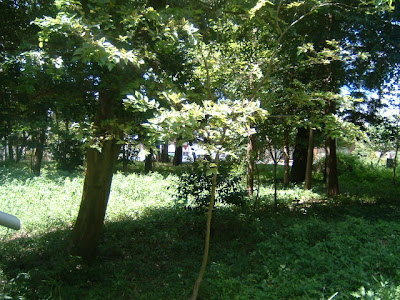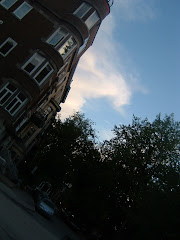
This unit was useful and very interesting as I have never learned such subject in the classroom in my country. The idea of "flow" was not so new for us oriental people, but what I was not familiar with is the way of analyzing abstract subject such as happiness using figures or percentages. I found it very occidental. Objective data is practical, helpful and give a strong impression. It helped me to think happiness from a different point of view. (But I cannot deny that some of them in Myers' article struck me as ridiculous too.)
For my previous post, I was supposed to give the "definition" of happiness. So I used "negation" to distinguish euphoria from happiness by their durations, but I also like the idea that a succession of short happy moments can be called happiness. Walking in a crisp morning air, seeing a pleasant smile, eating sweet cakes, buying favorite items, etc. We know that money "can't buy me love"(McCartney, 1964 lol), but money attracts people maybe because it seems to guarantee us those small euphoric moments (or rather comfortness?) endlessly.
Personally, I think the right way to happiness is to appreciate what we have already, be grateful for everything around us. In other words, accept everything (including imperfect ourselves) as they are. This may sound very passive. But on the other hand, I am attracted to the idea to take one's own way like in the following anecdote. I will "paraphrase", as I do not have the book at hand.
*********************
There was a beautiful river full of clear water. At the bottom of the river, there was a village. Habitants of the village had to cling onto grass or rock to stay where they were. But they did not find it inconvenient, as that was their way of life.
One day, one of those creatures cried out, "I'm fed up with such a life, I want to see somewhere else!" Others called him crazy and stopped him, saying "Don't be silly. If you release your hand, the flow will kill you by banging you on a rock." But he released his hand. First he was hurt badly by being crashed on a rock but soon the flow brought him up from the bottom.
He traveled down the river. Seeing him "flying", habitants of other villages were amazed and wanted to talk to him, but he disappeared from their sight in a second. The flying creature soon became a legend.
(Richard Bach, "Illusions")

The following is a piece of lyrics by Kazuo Zaitsu(1948-), a Japanese composer/singer. (by my poor translation)
Cast away your joy or sadness
Be simply happy just like a flowing river
Stop the search for happiness
Just be a 'happy body'
---An Aborning Star(1982)
What he meant is, I think, that happiness is beyond any emotions and remains just still there, within our body. Since body (the receptacle of our lives) is the biggest gift we've ever received, to be happy we just have to concentrate our mind on our bodily sense. (By the way, in meditation, it is often instructed to set your mind on this moment by concentrating on your breath or on auditory sense by listening to the "sound of silence".)
Asked "what is love to you?" in an interview in 1984, he talked about unexpected tears he sheds when he sees beautiful blue sky. Those tears are of sudden strong feeling of happiness, and with no reason. He answered this power which moves him to shed tears is the "Love" to him. By "Happy body", he meant a body with a pure mind (like a baby) which is sensitive to all kinds of beauty.
No need to understand each other as we are somewhat similar
Your being here is enough for me
No need to understand each other as we are different after all
---An Aborning Star
I enjoyed too much writing about this theme. Thank you if anyone still reading this line. :-)
Images: Album jackets of "A Picnic in 2222 (2222 nen picnic)" (top) & "The 10th oddyssey" (bottom) by Tulip
 More than one year has passed since my last entry. I finished my first year of undergraduate study here, and now I entered the second year. I came back to this deserted blog with no special reason, but if I force me to find a reason, it would be because I am beginning to be conscious about the fact that my days in Canada are actually numbered (I need to go back to my country as my money will run out in the next spring.) As this blog was started as a part of ESL class activity (which means I always had to care about what my professors and classmates would think of me) and has my name on it, I never could feel completely free when I write here, but now I am quite sure that no one I knew in Montreal bothers to look into this blog. I might start another anonymous blog someday, but for a while I will write down my impressions and feelings here until I am sure that I want to keep writing.
More than one year has passed since my last entry. I finished my first year of undergraduate study here, and now I entered the second year. I came back to this deserted blog with no special reason, but if I force me to find a reason, it would be because I am beginning to be conscious about the fact that my days in Canada are actually numbered (I need to go back to my country as my money will run out in the next spring.) As this blog was started as a part of ESL class activity (which means I always had to care about what my professors and classmates would think of me) and has my name on it, I never could feel completely free when I write here, but now I am quite sure that no one I knew in Montreal bothers to look into this blog. I might start another anonymous blog someday, but for a while I will write down my impressions and feelings here until I am sure that I want to keep writing.






 Shaved ice with strawberry syrup
Shaved ice with strawberry syrup








 On Friday night, I saw a movie "Mona Lisa Smile" (2003) on DVD. This is a movie depicting the challenge by a feminist teacher who tried to change the mindset of her students at a conservative women's college in 1950s.
On Friday night, I saw a movie "Mona Lisa Smile" (2003) on DVD. This is a movie depicting the challenge by a feminist teacher who tried to change the mindset of her students at a conservative women's college in 1950s.


